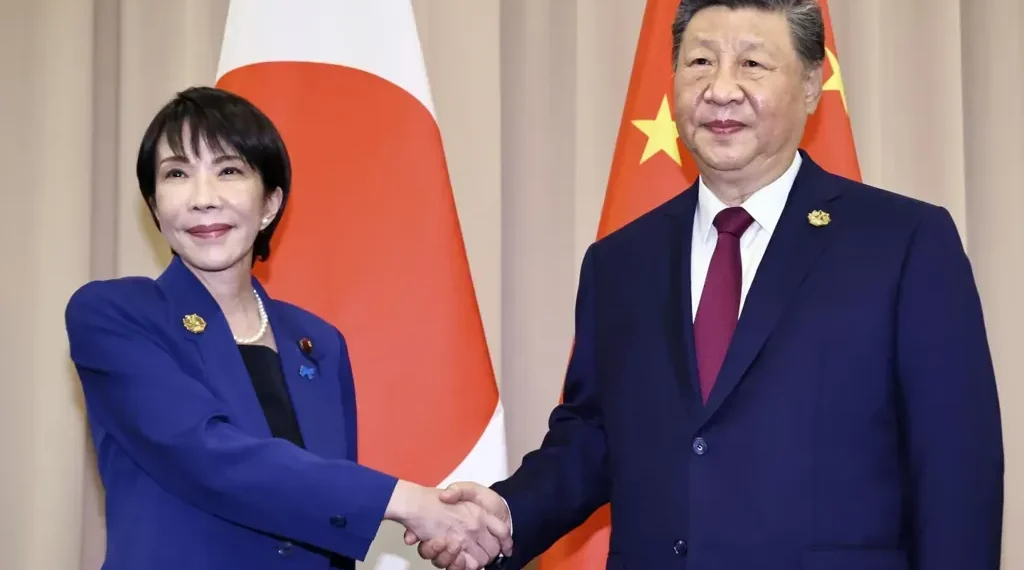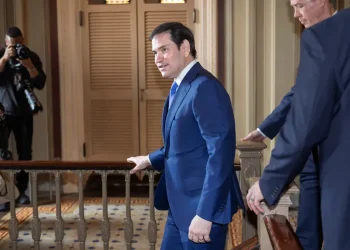Japan’s Takaichi Sparks Diplomatic Tension With China Over Taiwan
Japan’s newly elected Prime Minister Sanae Takaichi has drawn criticism from China after suggesting that Japan might respond militarily to Chinese actions against Taiwan. Beijing condemned the remarks, which mark a shift from past Japanese statements and highlight rising tensions in East Asia.
Takaichi Signals Possible Military Action
On Nov. 7, Prime Minister Sanae Takaichi told a parliamentary committee that a Chinese naval blockade or other hostile measures against Taiwan could justify a Japanese military response. Her comments were stronger than those of previous leaders, who have voiced concern over China’s influence without specifying Japan’s potential actions.
Three days later, Takaichi said she would avoid discussing specific scenarios in future statements but stopped short of retracting her original remarks. A longtime advocate for Taiwan, she has described China as an expanding threat and ordered plans to accelerate Japan’s military spending.
Foreign Minister Toshimitsu Motegi emphasized on Nov. 15 that Japan’s official stance on Taiwan has not changed, signaling continuity despite Takaichi’s assertive rhetoric.
China Issues Strong Reactions
Takaichi’s remarks triggered a swift and forceful response from Beijing. China’s Foreign Ministry, Defense Ministry, Taiwan Affairs Office, and state media all criticized her comments.
Wang Huiyao, president of the Beijing-based think tank Center for China and Globalization, said Takaichi’s statements were unexpected because tensions over Taiwan had not been unusually high.
China’s consul general in Osaka posted on social media that China could not tolerate intrusion, a statement later deleted. Motegi described the post as “extremely inappropriate.” China summoned Japan’s ambassador on Nov. 14 to deliver a warning against interfering in Taiwan, prompting Japan to summon China’s ambassador the following day to protest the social media message.
Beijing Increases Pressure on Japan
China has also targeted Japan economically and socially. On Nov. 15, it issued a travel advisory urging citizens to reconsider visits to Japan. Chinese tourists accounted for roughly 7.5 million of the country’s foreign visitors in the first nine months of the year, representing nearly one-fourth of total arrivals.
The Education Ministry advised Chinese students studying in Japan about safety concerns, without issuing a travel ban. Meanwhile, China’s coast guard announced patrols near uninhabited islands claimed by both countries.
Economic analysts note that Japan could face significant challenges if China were to restrict exports of rare earth magnets, crucial for automotive and high-tech manufacturing. No official indication suggests China is considering such measures, but the threat underscores the broader strategic stakes.
Japanese officials are seeking to calm tensions. Motegi said he plans to ask China for an “appropriate response” to prevent major disruption in bilateral relations.
The Role of the U.S.-Japan Security Alliance
Japan’s constitutional restrictions further complicate its options. Article 9 prohibits the use of force except for self-defense, and the country’s military is formally called the Self-Defense Force.
In 2015, former Prime Minister Shinzo Abe expanded Japan’s military scope by passing legislation allowing collective self-defense. This permits Japan to aid an ally—most likely the U.S.—if a conflict is deemed an existential threat to the nation.
Takaichi, who rose politically under Abe, indicated that a Chinese move against Taiwan could qualify as such a threat. Analysts note that a conflict involving North Korea and the U.S. could similarly trigger Japan’s collective self-defense provisions.
Tokyo has avoided retracting Takaichi’s remarks, preserving its strategic flexibility in a Taiwan crisis. Some observers warn that backtracking could weaken her public support and undermine her image as a firm defender of Japan’s security.
Strategic Implications for East Asia
Takaichi’s statements have drawn international attention, highlighting the fragility of regional security amid rising Chinese assertiveness. Japan seeks to balance a strong stance on China with the need to maintain economic and diplomatic ties, while leveraging its alliance with the United States to deter potential threats.
Analysts emphasize that the episode reflects growing regional concerns over Taiwan and the strategic signaling by East Asian powers. Takaichi’s remarks, while provocative, also aim to project Japan’s resolve and preparedness in an increasingly uncertain security environment.
AP News – A spat over Taiwan is threatening China-Japan ties
This article was rewritten by JournosNews.com based on verified reporting from trusted sources. The content has been independently reviewed, fact-checked, and edited for accuracy, neutrality, tone, and global readability in accordance with Google News and AdSense standards.
All opinions, quotes, or statements from contributors, experts, or sourced organizations do not necessarily reflect the views of JournosNews.com. JournosNews.com maintains full editorial independence from any external funders, sponsors, or organizations.
Stay informed with JournosNews.com — your trusted source for verified global reporting and in-depth analysis. Follow us on Google News, BlueSky, and X for real-time updates.














